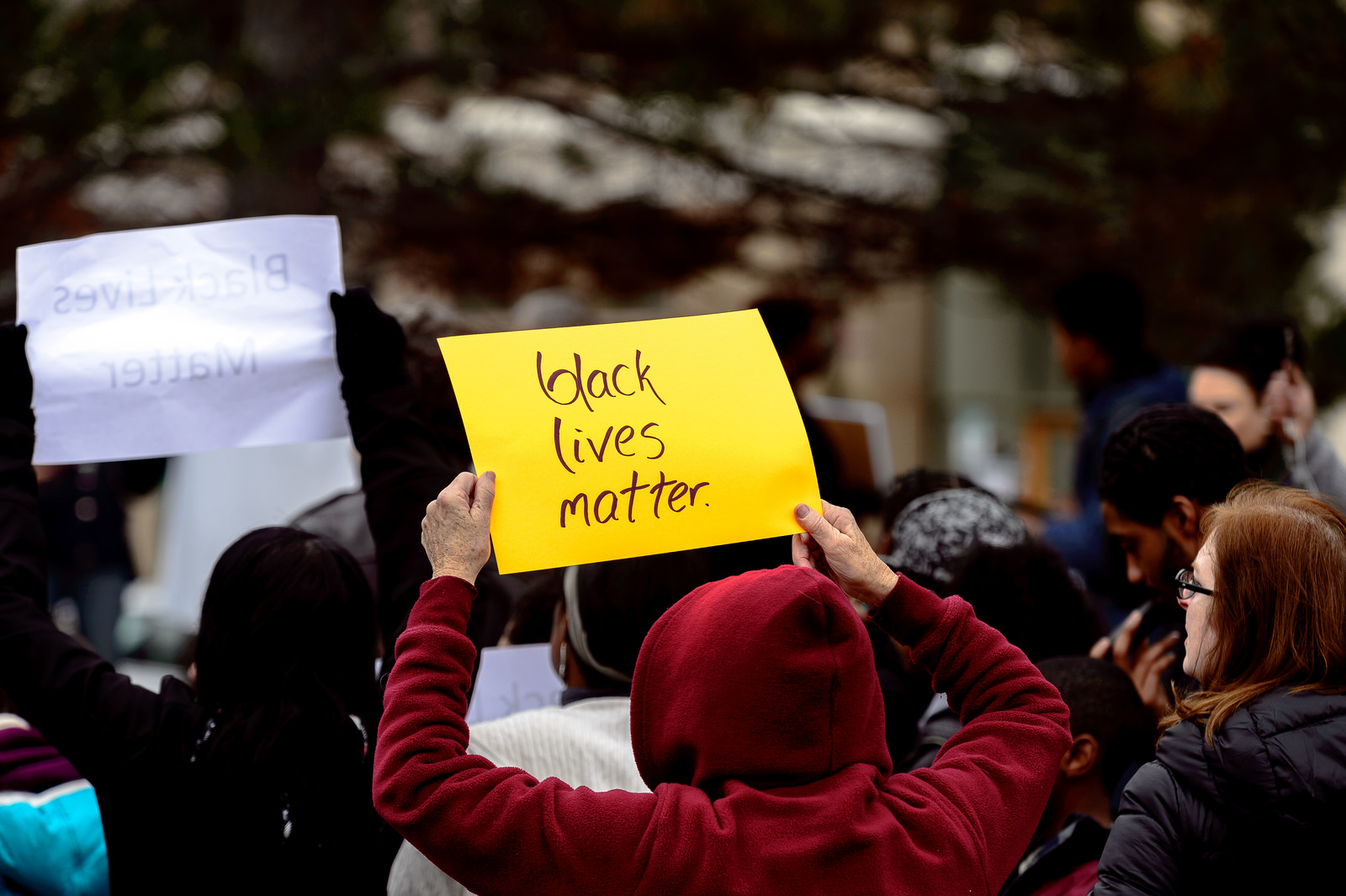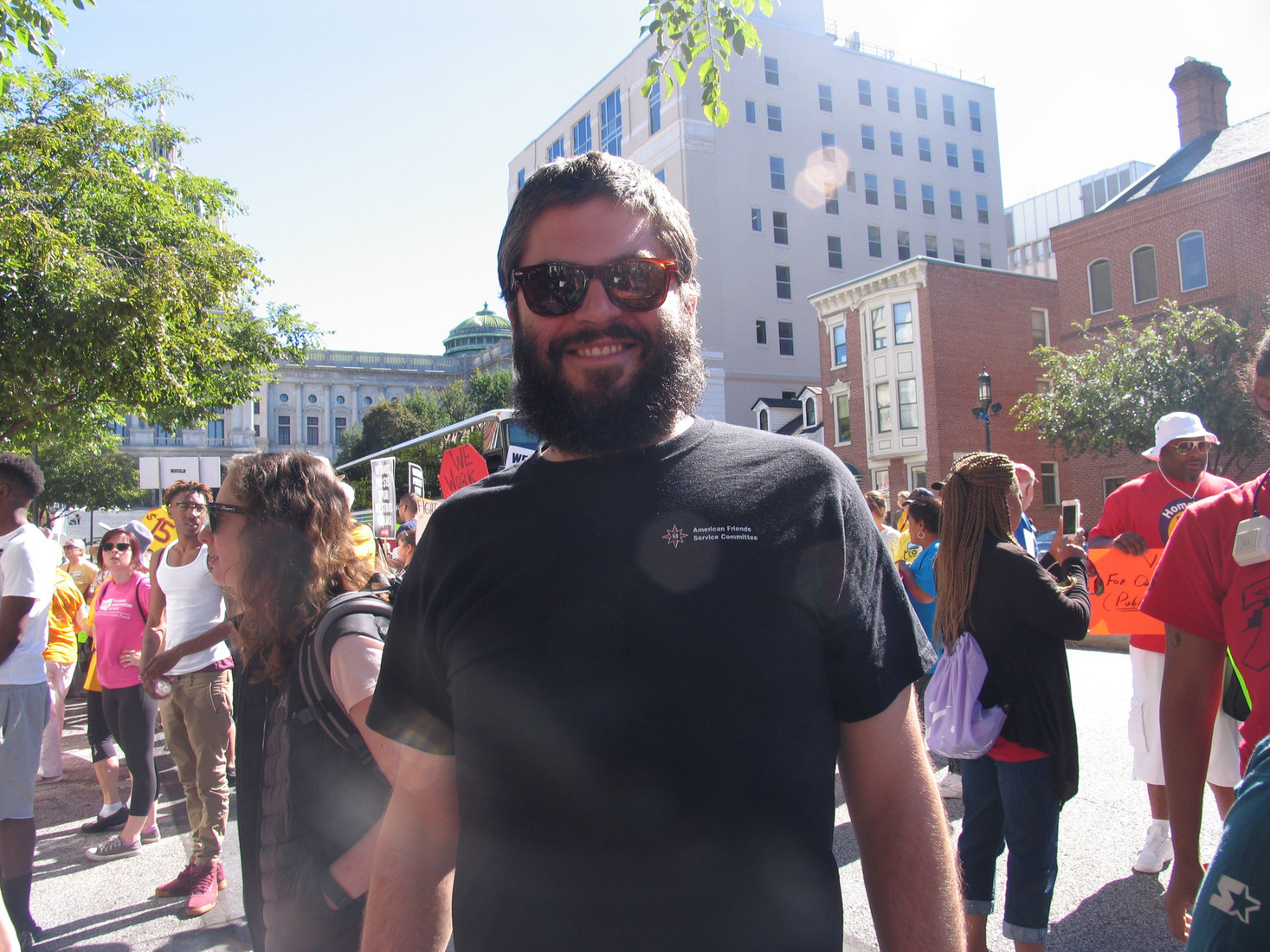
There is a lot of conversation going on in racial justice circles about the role of white folks in racial justice work, and there are a lot of different perspectives on the matter. One important question that has emerged is not simply, “What should white people do for racial justice?” but, “How should white people understand and think about their/our role in racial justice movements?” This goes beyond encouraging white folks to take action, though that is essential. Instead, it’s about creating a collective understanding of how and why it is in the shared interest of white folks to end white supremacy and racism.
This is NOT to say that white people should focus on ourselves and our supposed struggles as white people – white supremacy is, first and foremost, a system of oppressing and controlling Black and Brown people. Instead, it is necessary to call out the ways in which white supremacy is not in the best interest of anyone, including white folks, forcing us to trade in our humanity for power and privilege.
Showing Up for Racial Justice (SURJ), a prominent activist organization dedicated to mobilizing white folks for racial justice, puts it this way on their website:
We use the term ‘mutual interest’ to help us move from the idea of helping others, or just thinking about what is good for us, to understanding that our own liberation as white people, our own humanity, is inextricably linked to racial justice. Mutual interest means we cannot overcome the challenges we face unless we work for racial justice. It means our own freedom is bound up in the freedom of people of color.
But isn’t white supremacy a system that privileges white people?
While that is, of course, true, the cost of white privilege and white supremacy for white people is nothing short of trading in humanity for the illusion of comfort. In order to cash in on the privileges and benefits of white supremacy, white people must fear, disown, demean, ignore, dehumanize, exoticize, murder, incarcerate, and segregate ourselves from the majority of humanity. Naming the ways in which white supremacy wounds white people is a way to move past the “helping” or “service” model to become “co-conspirators” and “comrades” in the movement for racial justice.
What follows is a list of just some of the ways white supremacy wounds white people, including some specific examples from my own life:
1. Teaching white children from an early age to disconnect from people of color, distance ourselves, understand ourselves as "better than," thereby distorting and putting out of reach real human connection with most of humanity.
Growing up in rural, predominantly white Northeastern Pennsylvania, my parents would take me and my brother on trips to New York and Philadelphia. On the way there they would always prep us about how dangerous those cities were and ingrained in me an association between cities, Black and Brown people, and crime.
2. Learning to admire colonizers, rapists, slave-owners, misogynists, liars, thieves, and those who committed acts of genocide because history is only taught from the perspective of white supremacy which portrays those acts not only as defensible but also as "necessary evils."
William Penn was ingrained in my mind as a sort of “benevolent colonizer,” with tales of his fairness to the Lenape, his refusal to have an army, his religious tolerance, etc. I didn’t even know he was a slaveholder until adulthood.
3. Living on this land with no connection or understanding of the land we are on or knowledge of the indigenous peoples it was stolen from.
The house I grew up in, on the corner of a relatively busy street in my little town, always felt more like a Hollywood movie set than an actual place in the world – arbitrary, fabricated, and divorced from the landscape. And no one ever talked about the specific tribes whose land we were on – not once.
4. Refusing to acknowledge America’s “original sin” of racial, chattel slavery and genocide and a refusal to understand reparations as a spiritual and material necessity for addressing those traumas.
When I was a teenager, I asked my Dad if anyone in our family ever owned slaves, and he gave me a saddened, defensive look and said that he didn’t think so. As an adult, I have come to understand that this was a misguided question: my ancestors didn’t need to be slaveholders in order to benefit from the enslavement of African people.
5. Forcing people of European descent to erase our culture in order to conform to whiteness and white, dominant culture.
Both sides of my family have been in the United States since before the American Revolution, and I have zero tangible connection to the cultures and customs of my ancestors. The flip side of this was being raised in a white, middle class American family that had no understanding of itself as having a culture at all.
6. Instructing white people to dissociate from our bodies and revere 'thinking' over feeling, intimacy, or paying attention to the information/wisdom our bodies give to us.
This shows up for me especially in romantic relationships where it can take hours or even days to identify what I’m actually feeling instead of numbing out or intellectualizing. My parents also once said to me, “We don’t have any friends we can talk to about our feelings.” That was shocking to me but normal to them.
7. Ingraining in white people the values of dominance, greed, and simplistic notions of “winners” and “losers,” and rewarding those who display those qualities with ever increasing access to wealth and power and admiring them for their dominance.
Clarks Summit was the wealthier suburb of Scranton next door to Factoryville where I grew up, which was more working class. I remember visiting friends’ houses in Clarks Summit and being in awe of their wealth and possessions and had the feeling that I was missing out on things like big TVs, big couches, big houses, big everything. The flip side of this is that I looked down on the poorer, even more rural school district in the other direction and was pleased that I was not like them.
8. Fostering a sense that people of color are always interested in vengeance for the harms white people have perpetrated, creating a sublimated, constant anxiety about one's status and an inability to envision a world based on equity and human connection.
As a white person, it is hard for me to hear verbal expressions of Black anger and rage at the realities of white supremacy as anything but an indication of that person’s desire to commit physical violence against white people.
9. Distorting white people’s perception of truth by portraying white, racist lies as fact and portraying the real, lived experiences of people of color as false or exaggerated.
Growing up in the nineties, the white, middle-class, progressive adults around me (including my parents) told me that racism was largely a thing of the past and that our society was generally good and legitimate and only needed a few changes to right itself. The beating of Rodney King was perceived as a tragic aberration, not a daily lived experience of Black people in America.
10. Instilling in white people a scarcity mentality, making such things as neoliberal capitalism, mass incarceration, xenophobia, continued fossil fuel extraction, and the never-ending “War on Terror” appear defensible and even necessary.
Being raised white and middle class, I feel this embedded deep inside me. I am generally resistant to taking personal risks in order to challenge these indefensible realities because I am afraid of giving up my white comfort and safety. My parents taught me, “Get a good, middle-class salary, save money, and play it safe.” That voice has seemingly permanent residency in a corner of my mind.
Naming whiteness and white ways of being and differentiating them from what it means to be a human being is a necessity, especially in the presence of white folks who conflate the two so much so that they appear indistinguishable. White supremacy insidiously tricks white people not only into believing that we are supreme simply because we are white, but also that the end of white supremacy would mean an end to our own survival. Often a huge step in the process of facing whiteness is being able to distinguish one's spiritual self from one's socialized self, understanding that one's social self will continue to operate, but that there is a deeper, human self under the calcification of our hearts longing to remember that we are connected, we are One.
This is an incomplete list, so please feel free to add more examples in the comments section below.
Deep gratitude for the inspiration of Sharon Goens-Bradley, Jerry Elster, and my fellow workshop participants at the 2016 Friends General Conference Gathering. And thank you to Genevieve Beck-Roe and Lucy Duncan for their editing and contributions.
Related Content
Denormalizing whiteness for racial justice: A resource guide for Friends
Schooled in disconnection: Waking up and struggling for racial justice
Liberating faith: A conversation with Rabbi Brant Rosen on decolonizing Quaker and Jewish practice
Note to self: White people taking part in #BlackLivesMatter protests
